Interviews with Experts
9 Revolutionary Tips to Enhance Soil Health for Urban Trees
Are you struggling to maintain healthy soil for the trees in your urban environment? Urban trees face unique challenges, but with the right strategies, you can revolutionize the way you care for their soil.
From maximizing organic matter content to harnessing beneficial microbes, nine key tips can transform the health of the soil and ultimately the health of your urban trees.
These techniques will not only enhance the vitality of your trees but also contribute to a more sustainable and thriving urban ecosystem.
Key Takeaways
- Soil testing is crucial for assessing nutrient levels and identifying potential contaminants in urban soil.
- Using high-quality, slow-release fertilizer and ensuring proper distribution can optimize nutrient availability for trees.
- Maximizing organic matter content through composting and mulching improves soil structure and nutrient retention.
- Implementing cover cropping and strategic mulching techniques can enhance soil health, moisture levels, and biodiversity.
Importance of Soil Testing
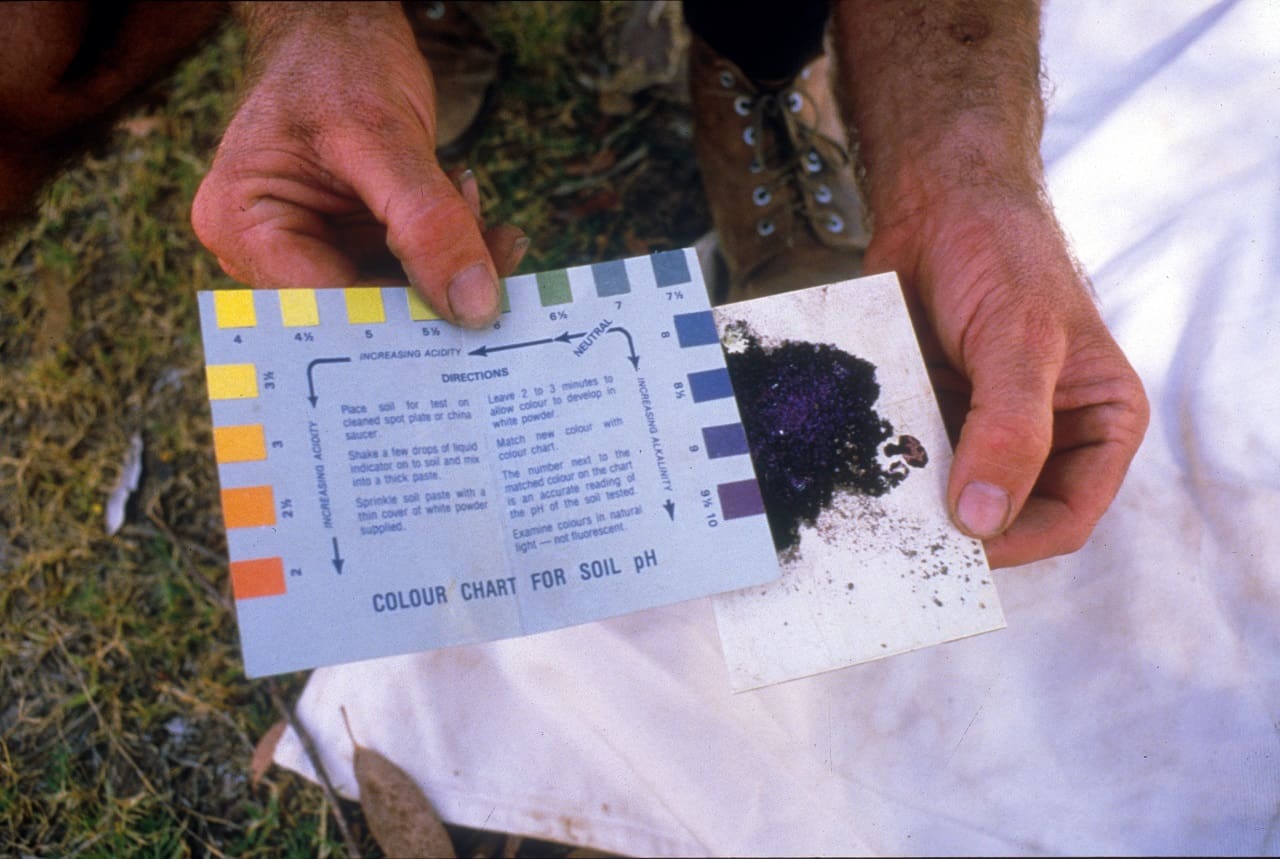

Soil testing is essential for understanding the specific nutrient and pH levels in urban soil, enabling informed decisions for tree health and growth. When it comes to urban tree care, soil testing serves as the foundation for creating a tailored soil management plan.
By analyzing the nutrient levels, particularly nitrogen, phosphorus, and potassium, you can determine if the soil provides adequate support for tree growth. Additionally, understanding the pH levels is crucial, as it directly impacts nutrient availability to the trees.
Soil testing also helps in identifying any potential contamination or pollutants present in the soil. This is particularly important in urban environments where soil may have been exposed to various pollutants from human activities. By conducting thorough soil tests, you can ensure that the trees aren’t only receiving the necessary nutrients but also aren’t being exposed to harmful substances.
Moreover, soil testing allows for the implementation of targeted fertilization and amendment strategies. By knowing the specific deficiencies or imbalances in the soil, you can apply fertilizers and soil amendments more efficiently, promoting the overall health and vigor of urban trees.
Maximizing Organic Matter Content
You can increase the organic matter content in soil through composting, which adds valuable nutrients and improves soil structure.
Mulching is another effective method for enhancing soil health by regulating temperature, retaining moisture, and suppressing weed growth.
Additionally, cover cropping can provide numerous benefits such as reducing erosion, increasing biodiversity, and adding organic matter to the soil when the cover crop is turned under.
Composting for Organic Matter
Maximizing the organic matter content in compost is essential for enhancing soil health and providing urban trees with the necessary nutrients for optimal growth. When composting for organic matter, ensure a good balance of green and brown materials.
Green materials, such as fruit and vegetable scraps, provide nitrogen, while brown materials, like dried leaves and wood chips, supply carbon. Chop materials into small pieces to accelerate decomposition and discourage pests. Keep the compost pile moist, but not waterlogged, to support microbial activity.
Turn the compost regularly to aerate it and speed up the decomposition process. Avoid adding diseased plant materials or weeds to prevent the spread of pathogens. By following these composting practices, you can produce high-quality organic matter to improve soil health and support the vitality of urban trees.
Mulching for Soil Health
To effectively maximize organic matter content for soil health, consider using a layer of mulch to enhance the nutrient retention and moisture levels around urban trees. Mulching provides numerous benefits, such as moderating soil temperature, suppressing weed growth, and preventing soil compaction.
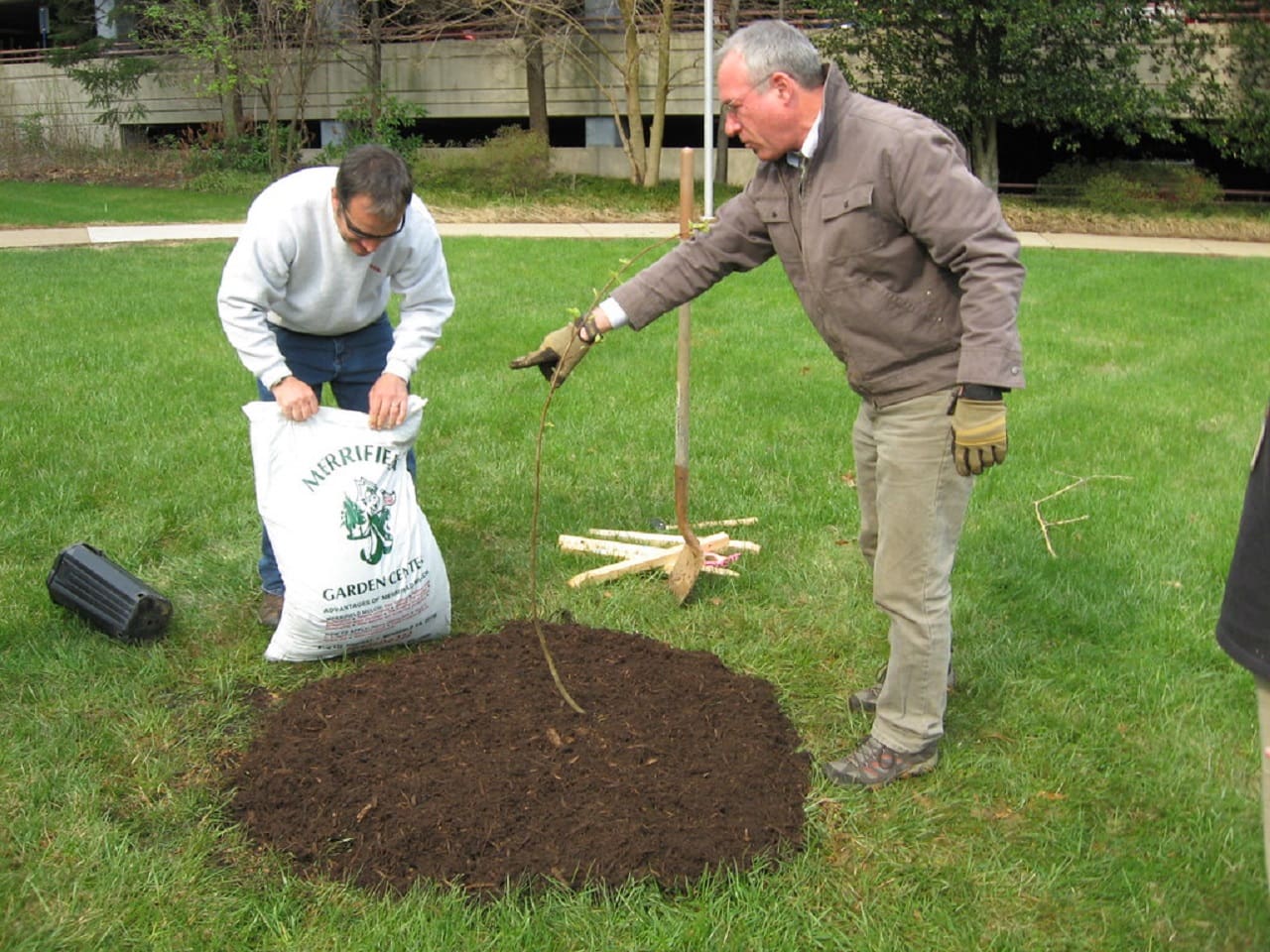

When selecting mulch, opt for organic materials like wood chips, bark, or leaves, as they gradually decompose, adding organic matter to the soil. Apply a 2- to 4-inch layer of mulch, ensuring it stays 3 to 4 inches away from the tree trunk to prevent moisture-related issues and pest infestations.
Be mindful not to over-mulch, as excessive mulch can lead to oxygen deprivation and root rot. Regularly monitor the mulch layer, replenishing it as needed, to maintain optimal soil health and support the well-being of urban trees.
Cover Cropping Benefits
To further enhance soil health and organic matter content around urban trees, consider implementing cover cropping as a method to maximize nutrient retention and improve moisture levels.
Cover crops, such as legumes and grasses, offer numerous benefits for urban tree soil health. They help increase organic matter content, which enhances soil structure, promotes beneficial microbial activity, and improves water infiltration.
Leguminous cover crops, like clover and vetch, fix atmospheric nitrogen, making it more available to trees. Grass cover crops, such as ryegrass, help prevent soil erosion, suppress weeds, and add organic matter when mowed and left as mulch.
Strategic Mulching Techniques
You should consider the depth of the mulch, as it plays a crucial role in soil moisture retention and temperature regulation.
Additionally, the frequency of mulching is an important factor to ensure a consistent layer is maintained to reap the benefits.
Various types of mulch materials have different impacts on soil health, so choosing the right one for the specific needs of urban trees is essential.
Mulch Depth
Strategically adjusting the depth of mulch around urban trees can significantly impact their health and vitality. To ensure optimal soil health and tree growth, follow these guidelines for mulch depth:
- Ideal Depth: Maintain a mulch layer around 2 to 4 inches deep. This depth provides adequate insulation and moisture retention without suffocating the tree roots.
- Avoid Piling: Refrain from piling mulch against the tree trunk, as it can lead to moisture accumulation and potential rot or disease.
- Extend Coverage: Extend the mulch layer to cover the entire area within the tree’s drip line, which promotes root development and protects the soil from compaction.
Mulching Frequency
Mulching frequency directly influences the soil’s moisture retention and temperature regulation, impacting the overall health and growth of urban trees. To maintain optimal soil conditions, it’s recommended to replenish mulch around urban trees annually.
However, in high-traffic areas or locations with harsh weather conditions, it may be necessary to refresh the mulch every six months. This frequency helps to ensure that the soil retains adequate moisture and remains insulated from extreme temperature fluctuations.
When replenishing mulch, be mindful not to exceed the ideal depth of 2-4 inches, as excessive mulch can lead to moisture retention issues and root suffocation.
Mulch Material Types
When selecting mulch materials for urban trees, consider the specific characteristics and benefits of each type to strategically enhance soil health and tree growth.
- Organic mulches, such as wood chips or bark, slowly decompose, adding organic matter to the soil and improving its structure.
- Inorganic mulches, like gravel or rocks, provide long-lasting weed control and help conserve soil moisture.
- Living mulches, such as low-growing plants or groundcovers, can improve soil aeration and nutrient cycling while also adding aesthetic value to the urban environment.
Selecting the right mulch material is crucial for the overall health of urban trees, as it not only helps in retaining soil moisture and reducing weed competition but also aids in maintaining a stable soil temperature and preventing soil erosion.
Always ensure that the chosen mulch material is free from harmful chemicals and contaminants to safeguard the tree’s well-being.
Essential Watering Guidelines
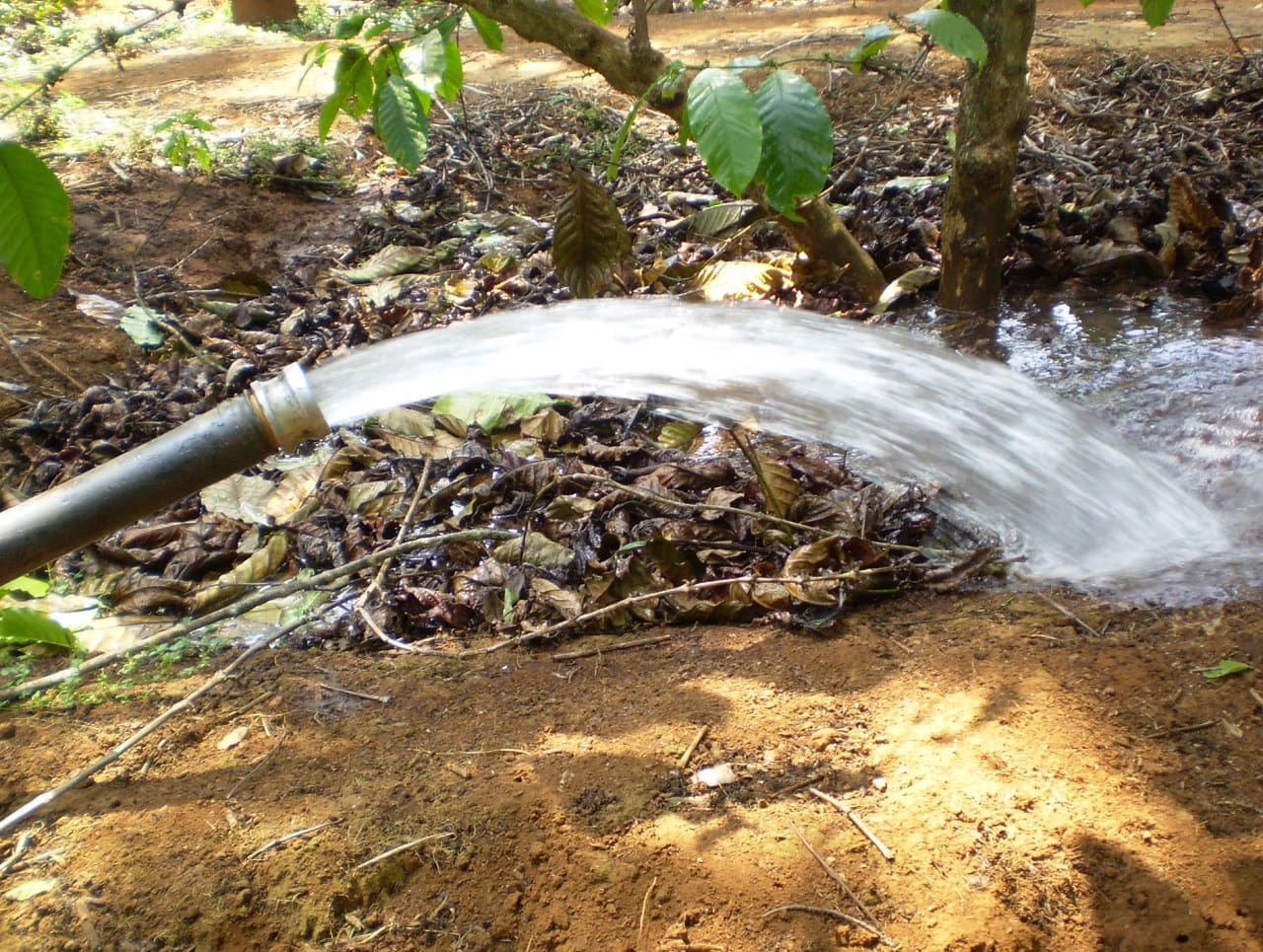

To ensure adequate hydration, it’s important to water urban trees deeply and infrequently, allowing the soil to dry out between watering sessions. Deep watering encourages the development of deep and robust root systems, making trees more resilient to drought and environmental stress. When watering, aim to moisten the soil to a depth of 12-18 inches, reaching the tree’s entire root zone. This can be achieved by applying water slowly and evenly over the root area, allowing it to penetrate the soil deeply.
It is crucial to water trees at the base rather than on the foliage, as wet foliage can lead to the development of diseases. Additionally, watering in the early morning is optimal, as it allows the foliage to dry during the day, reducing the risk of fungal growth.
When determining the frequency of watering, consider the tree species, soil type, and weather conditions. As a general rule, established urban trees typically require deep watering every 1-2 weeks during the growing season. However, monitoring the soil moisture level using a soil probe or moisture meter is recommended to avoid overwatering, which can lead to root rot and other issues.
Effective Nutrient Management
Regularly assessing the nutrient levels in the soil and implementing a targeted fertilization plan is essential for maintaining the health and vigor of urban trees. Proper nutrient management ensures that trees receive adequate nourishment for growth and resilience.
Here are three crucial steps for effective nutrient management:
- Soil Testing: Start by conducting a comprehensive soil analysis to determine the current nutrient levels. This will help identify any deficiencies or excesses, allowing for a tailored fertilization approach.
- Balanced Fertilization: Once the soil analysis is completed, select a high-quality, slow-release fertilizer with the appropriate balance of nitrogen, phosphorus, and potassium. This will provide a steady supply of essential nutrients to support tree health without causing rapid growth that can lead to structural issues.
- Application Technique: When applying fertilizer, ensure even distribution and proper incorporation into the soil to maximize nutrient uptake by the tree’s roots. Avoid excessive application near the trunk to prevent potential damage and promote uniform growth.
Balancing Ph Levels
Maintaining a balanced pH level in the soil is crucial for ensuring optimal nutrient availability and uptake by urban trees. The pH level indicates the acidity or alkalinity of the soil, which directly impacts the tree’s ability to absorb essential nutrients.
The ideal pH range for most urban trees is between 6.0 and 7.5. To balance the pH levels, start by conducting a soil test to determine the current pH status. If the pH is too low (acidic), adding lime can help raise it to the desired range.
On the other hand, if the pH is too high (alkaline), incorporating elemental sulfur can lower it. It’s important to apply these amendments gradually and monitor the pH levels regularly to avoid sudden, drastic changes that could stress the trees.
Additionally, consider using organic matter such as compost to buffer pH and improve overall soil health. By maintaining a balanced pH level, you can create an environment where urban trees can efficiently access the nutrients they need, promoting their growth and vitality.
Preventing Soil Compaction
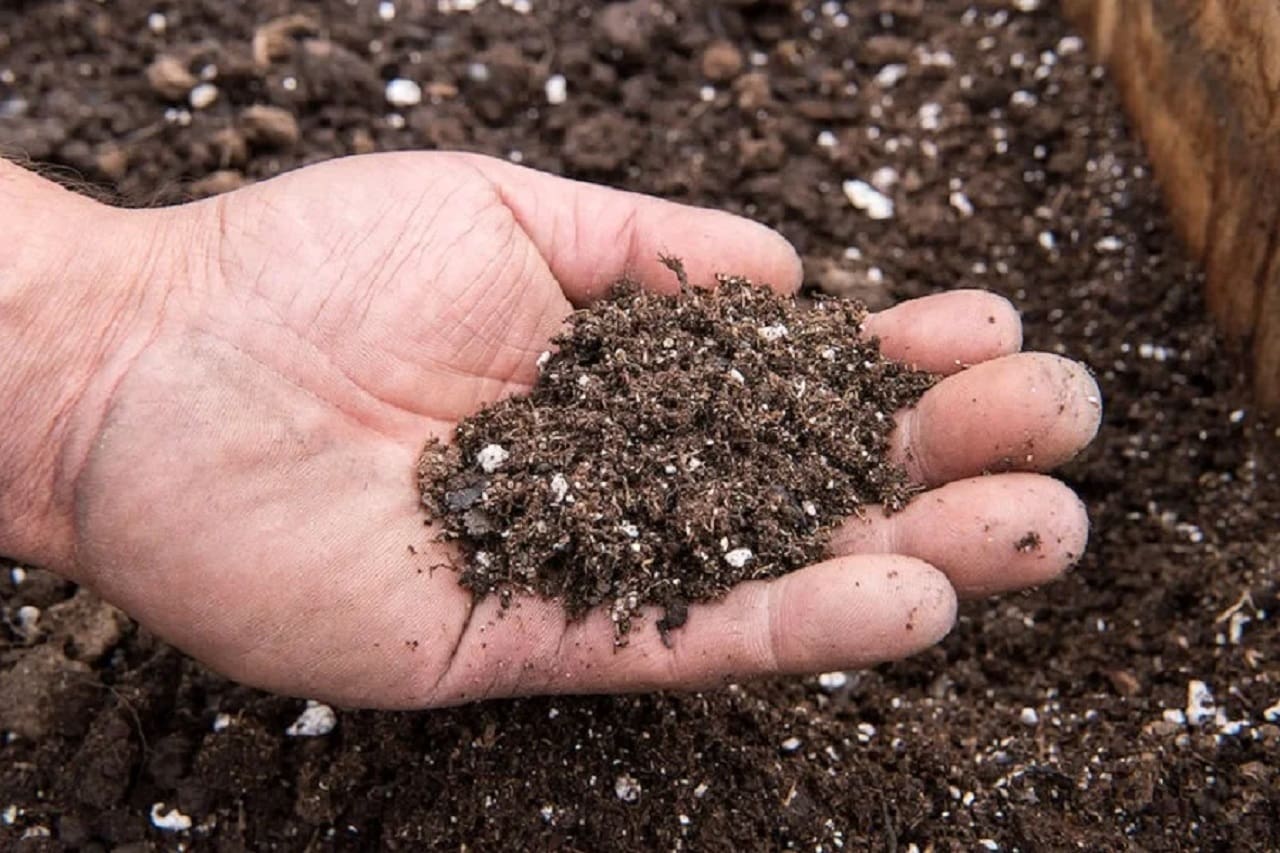

Prevent soil compaction by using specialized equipment designed to aerate the soil, allowing for better water and air movement. Soil compaction can significantly impact the health of urban trees, so it’s crucial to take proactive measures to prevent it. Here are some practical steps to help you prevent soil compaction:
- Aeration Tools: Utilize tools such as soil aerators or augers to break up compacted soil. These tools create holes in the soil, promoting better air and water penetration.
- Mulching: Apply a layer of organic mulch around the base of the tree to protect the soil from compaction. Mulch helps to distribute the weight of foot traffic or equipment, reducing the risk of soil compaction.
- Designated Pathways: Establish designated pathways or areas for foot traffic and equipment to minimize the impact on the soil around tree roots. This can help prevent unintentional soil compaction and protect the root systems of urban trees.
Prioritizing Root Aeration
To prioritize root aeration as a means of promoting urban tree health, it’s essential to recognize the detrimental impact of soil compaction and take proactive measures to address it. Soil compaction restricts the movement of air and water within the soil, leading to reduced root growth and vitality.
One practical method to enhance root aeration is through vertical mulching. This process involves drilling vertical holes into the soil around the tree, allowing air, water, and nutrients to penetrate deeper into the root zone.
Another effective technique is the use of an air spade to break up compacted soil without causing additional damage to the tree’s roots.
Additionally, incorporating organic matter such as compost into the soil can improve its structure, promoting better aeration.
It’s crucial to perform these tasks with caution, ensuring that underground utilities are located and avoided to guarantee safety.
Prioritizing root aeration through these methods will significantly enhance the overall health and longevity of urban trees.
Harnessing Beneficial Microbes
One practical approach to enhancing soil health for urban trees involves harnessing beneficial microbes to promote root vitality and overall tree well-being. By incorporating beneficial microbes into the soil, you can create a thriving environment for urban trees.
Here are three essential steps to effectively harness beneficial microbes:
- Choose the Right Microbial Inoculant: Select a high-quality microbial inoculant containing beneficial bacteria and fungi specifically formulated for tree health. Look for products that have undergone rigorous testing for safety and effectiveness.
- Apply the Inoculant Correctly: Follow the manufacturer’s instructions for the application of the microbial inoculant. Ensure that the inoculant is evenly distributed in the tree’s root zone to maximize its effectiveness without causing any harm to the tree or surrounding environment.
- Monitor and Maintain: Regularly monitor the soil to assess the microbial population and tree health. Adjust the application of the inoculant as needed to maintain a balanced and diverse microbial community in the soil, promoting a healthy and resilient urban tree ecosystem.
Harnessing beneficial microbes can significantly enhance soil health, providing urban trees with the support they need to thrive in challenging environments while ensuring safety for both the trees and the surrounding urban landscape.
Frequently Asked Questions
Can Urban Trees Thrive in Soil With High Levels of Pollution and Contaminants?
Yes, urban trees can thrive in soil with high levels of pollution and contaminants with proper soil management techniques. Regular soil testing, mulching, and appropriate tree species selection are key for promoting tree health in challenging urban environments.
Is It Possible to Improve Soil Health for Urban Trees Without Using Chemical Fertilizers?
You can improve soil health for urban trees without chemical fertilizers. By using organic amendments like compost and mulch, you can enhance soil structure and fertility, creating an environment as nurturing as a well-tended garden.
How Can Urban Tree Owners Encourage the Growth of Beneficial Microbes in the Soil?
To encourage beneficial microbes in urban tree soil, introduce organic matter like compost, mulch, and cover crops. Avoid chemical fertilizers and pesticides that can harm these microbes. Water deeply and infrequently to foster a healthy microbial ecosystem.
Are There Specific Watering Techniques That Are More Effective for Different Types of Urban Trees?
For different types of urban trees, specific watering techniques are more effective. Consider the tree’s species, size, and environmental conditions. Adjust watering frequency and volume accordingly to ensure optimal soil moisture and tree health.
What Are Some Innovative Methods for Preventing Soil Compaction in Urban Environments With Limited Space?
To prevent soil compaction in urban areas with limited space, try using vertical mulching, installing aeration tubes, and employing structural soil. These innovative methods can help improve soil health for urban trees and promote better root growth.
8 Essential Garden Soil Amendments to Improve Plant Health
Promote Plant Growth with Sukh’s Fine Vermiculite
Sukh’s 305OZ Vermiculite is a fine horticultural grade soil amendment that every gardener should consider. Priced at $9.99, this organic vermiculite is perfect for enhancing soil aeration and moisture retention. The 1-3mm size granules are ideal for mixing into potting soils for potted plants and in garden beds. It encourages vigorous root development and ensures plants have access to water when they need it. Make your garden more resilient and your plants more vibrant with Sukh’s Vermiculite.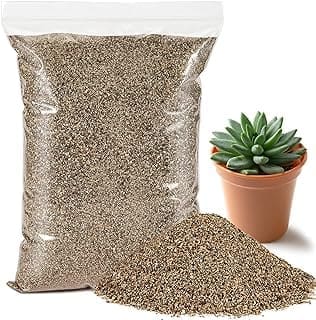

Improve Your Soil Structure
Unlock Plant Potential with BioBoost Liquid Soil Treatment
For gardeners seeking an all-natural solution to enhance plant and root growth, BioBoost Liquid Soil Treatment is the ultimate choice. This 2oz concentrated liquid fertilizer enhancer, priced at $22.50, is designed for plants and gardens of all types. It’s an organic soil treatment that promotes sustainable development, ensuring your plants receive the vital nutrients they need, and minimizing the need for chemical fertilizers. Incorporate BioBoost into your gardening regimen for healthier, more resilient plants.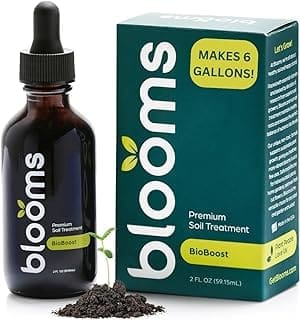

Boost Your Garden’s Growth
Essential Gypsum Powder for Mushroom Cultivation
Perfectly suited for mushroom growers, this Lab Grade Gypsum Powder offers a pure and potent soil amendment for creating the ideal substrate. Packaged in a HEPA enclosure to ensure cleanliness and prevent contamination, this 1 lb of Calcium Sulfate Dihydrate, priced at $9.95, is a must-have for any serious mycologist. It helps to balance the pH and supplies essential calcium and sulfur to promote healthy mushroom development. Incorporate it into your substrate mixture for optimal mushroom growth.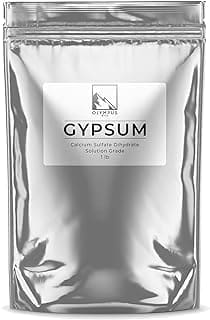

Enhance Your Substrate Today
Organic Perlite for Enhanced Plant Growth and Drainage
Improve your potting mixes with Organic Perlite, an indispensable soil amendment for enhanced drainage and plant growth. This 1-quart bag, available for just $6.99, is perfect for gardeners seeking to promote root aeration and moisture retention in container plants. Whether you’re growing vegetables, flowers, or houseplants, adding perlite to your soil mix can significantly impact your plants’ health and vitality. Choose Organic Perlite for a lightweight, efficient way to boost your garden’s performance.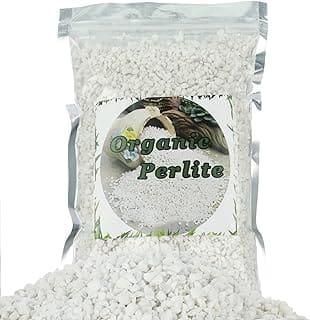

Get Your Organic Perlite Now
Optimize Water Retention with Hard Akadama Bonsai Soil
For enthusiasts of cacti, succulents, and bonsai, the search for the perfect soil amendment ends with Hard Akadama Bonsai Soil. This specific 5lb pack, available for $20.99, features small grains (1/8-1/4 inch) that prevent over-watering by ensuring optimal water retention and fast drainage. Whether you’re an expert or novice in the art of bonsai, incorporating this soil into your plant care routine will support the health and growth of your cherished plants.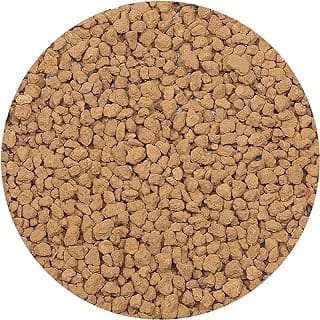

Enhance Your Bonsai Experience Now
Revitalize Your Garden Soil with USA-Made Gypsum Powder
This Gypsum Powder, made in the USA and OMRI listed, is a versatile garden soil amendment, priced at $17.99 for a 5LB bag. Suitable for lawns, plants, and specialized in curing blossom end rot, it’s a must-have for gardeners focusing on sustainable cultivation. The calcium sulfate dihydrate formula addresses calcium and sulfur deficiencies without altering soil pH. Use this product to enhance soil quality, encourage healthy plant roots, and ensure your garden thrives.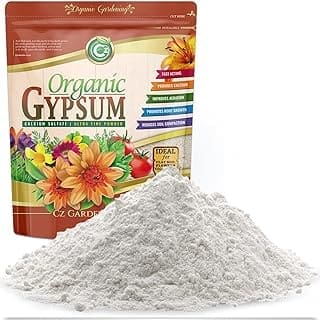

Get Superior Soil Quality
Strengthen Roots with Burpee Bone Meal Fertilizer
Enhance the foundation of your garden with Burpee Bone Meal Fertilizer, an essential soil amendment that focuses on strong root development. Perfect for tomatoes, peppers, bulbs, and more, this OMRI listed product ensures your gardening practices remain organic. The 3 lb pack, priced at $8.97, makes it an economical choice for gardeners seeking robust plant growth. Ensure your garden’s longevity and productivity with this time-tested soil booster.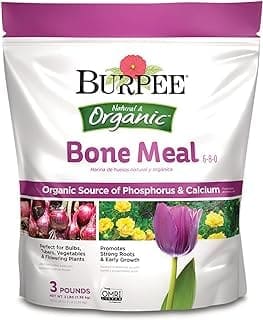

Promote Strong Plant Growth
Worm Bliss: Premium Organic Earthworm Castings for Vibrant Gardens
Worm Bliss offers a pure, organic way to enhance your garden’s fertility and plant vigor. This 1-quart package of earthworm castings, priced at $12.99, serves as an all-natural fertilizer and soil enhancer. Suitable for plants, vegetables, flowers, and indoor and outdoor gardens, it integrates effortlessly into potting mixes, enriching the soil with essential nutrients. Adopt Worm Bliss for a sustainable gardening approach that promotes stronger, healthier plant growth.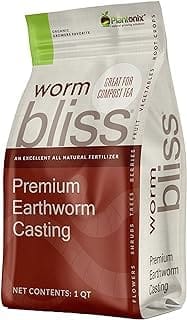

Enhance Your Garden Soil Naturally


Hello there! I’m Logan Foster, the green-thumbed social media marketer behind the vibrant world of 1800TreeGuy.com. With roots firmly planted in arboriculture, I’ve branched out to help clients cultivate their dream outdoor spaces, one leafy canopy at a time. My knack for nurturing nature is more than a profession—it’s a way of life.
When I’m not talking trees and teaching the art of arboreal care, you can find me cheering on the Bulldogs—my alma mater’s pride and my forever team. My environmental studies there didn’t just teach me about ecosystems; they instilled a lifelong passion for protecting our planet.
Off the clock, I’m an adventurer at heart. Whether it’s trekking the Appalachian trails, pedaling down a mountain path, or crafting guides to share the wonders of the wild, I’m happiest with soil under my nails and the sun on my face. And let’s not forget Yoda, my pug sidekick. He may not have mastered the art of stillness, but his joyful grins are my daily dose of happiness.
I’m all about making connections—between people and the great outdoors and between my clients and their ideal landscape visions. My approach is personal; every tree has a story, and every garden reflects its caretaker.
If you want to green your scene or share in my outdoor escapades, give me a shout on Instagram or Facebook. Let’s cultivate a conversation and grow a community rooted in a love for the lush life.







